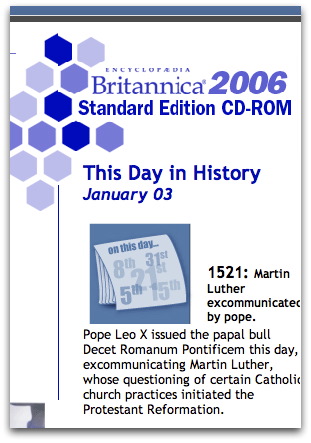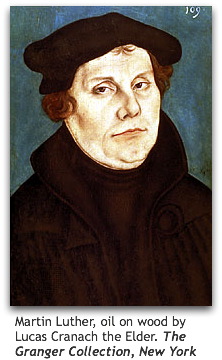Martin Luther Was Excommunicated on This Day and Why I Love the Encyclopedia Britannica
I have always loved encyclopedias. When I was a child I grew up with a set of 1967 World Book Encyclopedias in our house. These were bought the year I was born from my grandmother, who used to sell them to supplement her elementary school teacher income. I didn't just use them to plagiarize school reports like all the other kids; rather, I would sit and read them for hours, like a good book. Often I started with one article that I was interested in, but the "see also's" would take hold of me, and before I knew it, I was surrounded by stacks of the various volumes.

Kathy on the other hand, as a children's librarian hates the Encyclopedia Britannica because she says its reading level is too high, it doesn't have enough pictures, and it doesn't have enough pictures in color. Plus, she says, physical encyclopedia sets go out of date too quickly, and she's thrown away dozens of sets over her career (I shudder to even think of such things). Of course, I counter that we don't have children yet, so I don't want an encyclopedia set for them--I want it for myself. And going out of date isn't an issue because of yearbooks, not to mention the fact that most of my interests are of a historical nature and therefore, won't go out of date. She'll eventually counter with, "Well, we can't afford it right now," and I have no real argument for that one.
You're wondering when Martin Luther is going to come into this, aren't you?

Needless to say, she ordered it and gave it to me for Christmas. Maybe it was only $10, but it is one of my favorite gifts. I've already found myself lost in the "see also's," bounding from one article to the next, but this time without books stacking up around me. It's wonderful having it on my computer with so much information at my fingertips whether I'm online or not. Isn't this what computers were made for? I still want the print set one day, mind you (I'll fight that battle later), but for right now, the CDROM version of Britannica will do. In fact, it lets me install the whole thing on my computer, so I don't even have to carry the disks around.
So anyway, this afternoon I fired up it my to make sure I was right about brontosauruses never existing for my King Kong movie review (see the previous entry) and I happened to notice on the main interface that the "This Day in History" was all about Martin Luther's excommunication. Wow. I mean, how could this program even know I would be interested in such things? I know, I know...I'm sure it was just a random selection from history, but for a moment I felt as if the program had scoured my hard drive looking for things I'm interested in.
That led me to wonder what kind of article Britannica had on Martin Luther, so I looked him up. In addition to the main article, the software informed me that over 1900 articles made reference to Martin Luther, although undoubtedly many refer to Martin Luther King Jr. However, even with a quick sweep of the other articles I saw entries on "Conflict with Luther (from Leo X)"; "Relations with Luther (from Zwingli, Huldrych)"; "Worms, Diet of"; "Frederick III"; "Schmalkaldic Articles"; and hundreds of others.

I was curious as to the length of the article since it is hard to tell looking at a computer screen. So I copied and pasted it into a word processor. With a 12 point, single-spaced Arial font, it came out to 22 pages. That's not too bad for an encyclopedia article in my opinion. As for the information about the event in today's history that caught my eye, Professor Rupp had this to say:
In January 1521 the pope issued the bull of formal excommunication (Decet Romanum Pontificem), though it was some months before the condemnation was received throughout Germany. Meanwhile, the imperial Diet was meeting at Worms, and there was a good deal of lobbying for and against Luther. In the end, Frederick the Wise obtained a promise from the emperor that Luther should not be condemned unheard and should be summoned to appear before the Diet. This enraged Aleandro, who asserted that the papal condemnation was sufficient and that the secular arm had only to carry out its orders. It also alarmed Luther's friends, who did what they could to dissuade him. Luther was firm in his determination to go, and began the journey in April 1521, undeterred by the news, on the way, that the emperor had ordered his books to be burned. What was meant to be the safe custody of a heretic turned out to be something like a triumphal procession, and when Luther entered Worms on April 16 he was attended by a cavalcade of German knights and the streets were so thronged as to enrage his enemies.
The Decet Romanum Pontificem is indexed so as to link to the Luther article and to the article on Leo X.
Thanks for my gift, Kathy, and letting me get lost in the "see also's" once again...until we get the print version one day....









